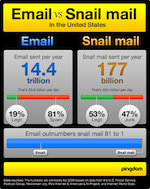Posted in
Main on October 15th, 2010 by Pingdom
 Looks like the tide of the web API protocol war (if there ever was one) has shifted firmly in REST’s favor while SOAP has been forced back. Web developers have cast their votes, they want RESTful APIs.
Looks like the tide of the web API protocol war (if there ever was one) has shifted firmly in REST’s favor while SOAP has been forced back. Web developers have cast their votes, they want RESTful APIs.
Here is the distribution of the different API protocols and styles, comparing the situation in 2008 versus that of 2010, based on ProgrammableWeb’s directory of more than 2,000 web APIs.
Read more
Posted in
Main on October 13th, 2010 by Pingdom
 Google Chrome is a great web browser. It has a super-fast Javascript engine, it renders pages with the standards-friendly Webkit, it’s minimalistic and easy to use. It’s also been developed at a breakneck pace, reaching version 6 (!) in little more than two years. With Chrome, Google has really pushed the envelope in terms of speed and stability.
Google Chrome is a great web browser. It has a super-fast Javascript engine, it renders pages with the standards-friendly Webkit, it’s minimalistic and easy to use. It’s also been developed at a breakneck pace, reaching version 6 (!) in little more than two years. With Chrome, Google has really pushed the envelope in terms of speed and stability.
But Chrome has one huge disadvantage compared to basically every other browser out there: Really, REALLY awkward bookmark handling. And this is completely unnecessary.
Let us explain… and propose a solution.
Read more
Posted in
Main on October 7th, 2010 by Pingdom
 These days it seems like Android is on the lips of every tech geek out there, and it is arguably one of the most successful Linux-based products ever. But Android is not the only Linux-based mobile OS in town. Far from it.
These days it seems like Android is on the lips of every tech geek out there, and it is arguably one of the most successful Linux-based products ever. But Android is not the only Linux-based mobile OS in town. Far from it.
In fact, Linux is such a common base for mobile operating systems that you may very well have used feature phones or smartphones running Linux without ever realizing it.
Here we will present 10 Linux-based mobile OSs other than Android, and these aren’t even all that exist.
Read more
Posted in
Main on October 4th, 2010 by Pingdom
 Google’s Chrome web browser has only been around for two years, but with an almost frantic pace of development it’s already gone through more iterations in that brief time than many other software products do in a decade. Chrome is now up to version 6, and has a rapidly increasing share of the web browser market. It’s now in third place after Firefox and Internet Explorer.
Google’s Chrome web browser has only been around for two years, but with an almost frantic pace of development it’s already gone through more iterations in that brief time than many other software products do in a decade. Chrome is now up to version 6, and has a rapidly increasing share of the web browser market. It’s now in third place after Firefox and Internet Explorer.
Before Chrome arrived, Mozilla’s Firefox was the darling of the techie crowd (and in many regards it still is, but Chrome is a great, looming shadow on the horizon). Now, Firefox growth has flatlined. It’s still by far the largest web browser after Internet Explorer, but it’s no longer gaining market share.
Read more
Posted in
Main on September 29th, 2010 by Pingdom
 Enormous amounts of email circulate the Internet every day, there can be no doubt about that. But how does the amount of email compare with that of traditional mail, also known as “snail mail”?
Enormous amounts of email circulate the Internet every day, there can be no doubt about that. But how does the amount of email compare with that of traditional mail, also known as “snail mail”?
It would be interesting to know, wouldn’t it?
We’ve done the research and done the math, so look no further than the small infographic we’ve put together here below, a comparison of email and snail mail volumes in the United States.
Enjoy!
Read more
Posted in
Main on September 27th, 2010 by Pingdom
 There has been much said about the imminent demise of RIM’s Blackberry in the face of the unstoppable momentum of Android (and previously the iPhone). But here’s an interesting piece of information: According to data from Statcounter, Blackberry is growing just as fast as Android, at least in terms of global Web usage. Blackberry users have doubled their Web presence in the last 12 months.
There has been much said about the imminent demise of RIM’s Blackberry in the face of the unstoppable momentum of Android (and previously the iPhone). But here’s an interesting piece of information: According to data from Statcounter, Blackberry is growing just as fast as Android, at least in terms of global Web usage. Blackberry users have doubled their Web presence in the last 12 months.
So while some recent reports say that Blackberry is falling behind in the mobile race, perhaps that is not the case after all.
Read more
Posted in
Main on September 22nd, 2010 by Pingdom
 Google is doing it. Facebook is doing it. Yahoo is doing it. Microsoft is doing it. And soon Twitter will be doing it.
Google is doing it. Facebook is doing it. Yahoo is doing it. Microsoft is doing it. And soon Twitter will be doing it.
We’re talking about the apparent need of every web service out there to add intermediate steps to sample what we click on before they send us on to our real destination. This has been going on for a long time and is slowly starting to build into something of a redirect hell on the Web.
And it has a price.
Read more
Posted in
Main on September 17th, 2010 by Pingdom
 In July we had a look at the worldwide state of the Internet. Now the time has come for something a bit more specific, the state of the Internet in Europe. We’ll look at this from two angles. First, which countries in Europe have the most Internet users, and second, which countries have the highest Internet penetration. Both are relevant in their own right.
In July we had a look at the worldwide state of the Internet. Now the time has come for something a bit more specific, the state of the Internet in Europe. We’ll look at this from two angles. First, which countries in Europe have the most Internet users, and second, which countries have the highest Internet penetration. Both are relevant in their own right.
Since Europe is such a diverse market with a multitude of countries and different languages, it makes sense to look at these countries separately. This contrary to the trend where people sometimes try to think of the European Union (much of, but not all of, Europe) as some kind of equivalent of the United States. The language issue alone makes the comparison moot.
Read more
Posted in
Main on September 15th, 2010 by Pingdom
 Last year, Google bought an old paper mill in Finland. Now the company is in process of converting that paper mill into a major data center. Construction is already well underway, and the data center is expected to go live next spring. It will be Google’s first dedicated data center in the Nordic countries, with several interesting innovations, for example being cooled entirely by sea water.
Last year, Google bought an old paper mill in Finland. Now the company is in process of converting that paper mill into a major data center. Construction is already well underway, and the data center is expected to go live next spring. It will be Google’s first dedicated data center in the Nordic countries, with several interesting innovations, for example being cooled entirely by sea water.
Swedish magazine Computer Sweden was recently on location in Finland and has published an article (in Swedish) with new information and pictures from the build. We’ve summarized the important parts of that article and also what other information we could find around the Web, mostly from Finnish newspaper articles.
Read more
Posted in
Main on September 10th, 2010 by Pingdom
 User behavior differs greatly between websites. We wanted some hard data on what kind of websites get the most page views out of their visitors, and examined the top 1,000 websites on the Internet to find out.
User behavior differs greatly between websites. We wanted some hard data on what kind of websites get the most page views out of their visitors, and examined the top 1,000 websites on the Internet to find out.
What we specifically looked at was monthly page views per unique visitor. We calculated this number using traffic data from Google Ad Planner, then sorted the list by that number to create a “page views per visitor” top list.
The results, although not entirely unexpected, are interesting.
Read more
 Looks like the tide of the web API protocol war (if there ever was one) has shifted firmly in REST’s favor while SOAP has been forced back. Web developers have cast their votes, they want RESTful APIs.
Looks like the tide of the web API protocol war (if there ever was one) has shifted firmly in REST’s favor while SOAP has been forced back. Web developers have cast their votes, they want RESTful APIs.
 Google Chrome is a great web browser. It has a super-fast Javascript engine, it renders pages with the standards-friendly Webkit, it’s minimalistic and easy to use. It’s also been developed at a breakneck pace, reaching version 6 (!)
Google Chrome is a great web browser. It has a super-fast Javascript engine, it renders pages with the standards-friendly Webkit, it’s minimalistic and easy to use. It’s also been developed at a breakneck pace, reaching version 6 (!)  These days it seems like Android is on the lips of every tech geek out there, and it is arguably one of the most successful Linux-based products ever. But Android is not the only Linux-based mobile OS in town. Far from it.
These days it seems like Android is on the lips of every tech geek out there, and it is arguably one of the most successful Linux-based products ever. But Android is not the only Linux-based mobile OS in town. Far from it. Google’s
Google’s  Enormous amounts of email circulate the Internet every day, there can be no doubt about that. But how does the amount of email compare with that of traditional mail, also known as “snail mail”?
Enormous amounts of email circulate the Internet every day, there can be no doubt about that. But how does the amount of email compare with that of traditional mail, also known as “snail mail”? Google is doing it. Facebook is doing it. Yahoo is doing it. Microsoft is doing it. And soon Twitter will be doing it.
Google is doing it. Facebook is doing it. Yahoo is doing it. Microsoft is doing it. And soon Twitter will be doing it. In July we had a look at the
In July we had a look at the  Last year, Google bought an old paper mill in Finland. Now the company is in process of converting that paper mill into a major data center. Construction is already well underway, and the data center is expected to go live next spring. It will be Google’s first dedicated data center in the Nordic countries, with several interesting innovations, for example being cooled entirely by sea water.
Last year, Google bought an old paper mill in Finland. Now the company is in process of converting that paper mill into a major data center. Construction is already well underway, and the data center is expected to go live next spring. It will be Google’s first dedicated data center in the Nordic countries, with several interesting innovations, for example being cooled entirely by sea water. User behavior differs greatly between websites. We wanted some hard data on what kind of websites get the most page views out of their visitors, and examined the top 1,000 websites on the Internet to find out.
User behavior differs greatly between websites. We wanted some hard data on what kind of websites get the most page views out of their visitors, and examined the top 1,000 websites on the Internet to find out.


